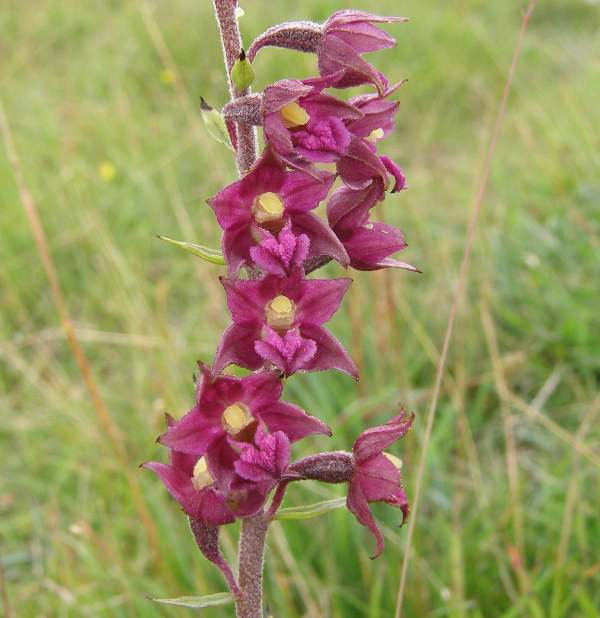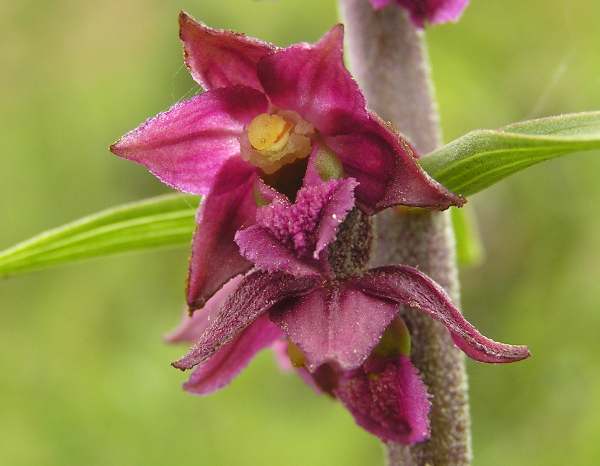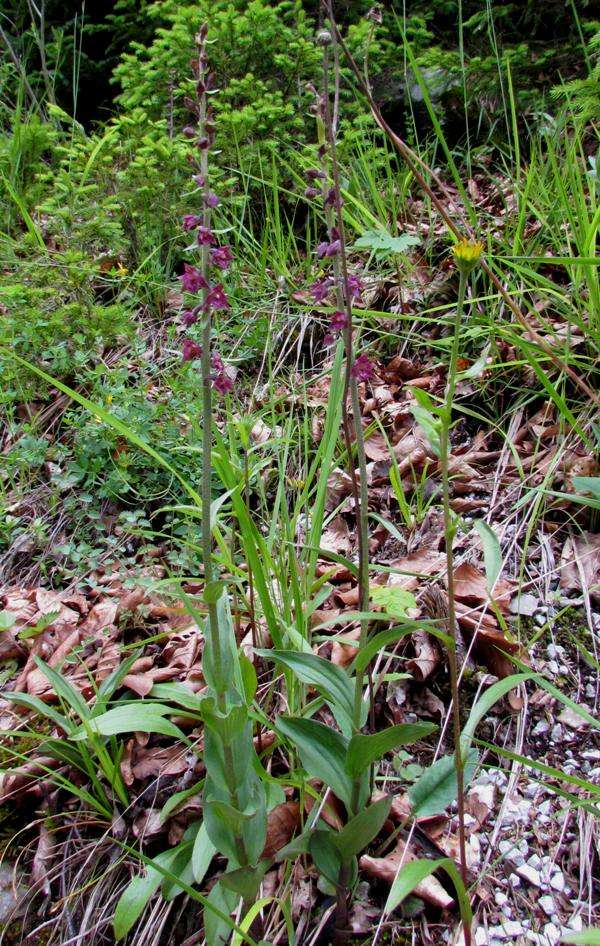Epipactis atrorubens - Dark-red Helleborine
Phylum: Magnoliophyta - Class: Liliopsida - Order: Orchidales - Family: Orchidaceae

This beautiful orchid is becoming increasingly rare in the UK but can still be found in large numbers in parts of mainland Europe.
Description
Dark-red Helleborines can grow up to 30cm in height. The leaves are distinctive and grow on either of the side of the stem almost in opposite facing pairs. They are deeply ridged and heavily veined, but leaves higher up the stem are longer and narrower. The distinctive facing leaves are an important clue to identification, because the Dark-red Helleborine is sometimes confused with pink specimens of the Broad-leaved Helleborine (Epipactis helleborine) in the UK, and with other deep pink Epipactis species in Europe.
The blood-red flowers have a deep v-shaped roughened structure (boss) on the lip, and the anthers and pollinia in the centre of the flowers are yellow.

Distribution
In the UK the distribution of Epipactis atrorubens is reduced to a few areas of limestone rock and pavement and this orchid is becoming increasingly scarce.
Good places to see this lovely orchid in the UK include Gait Barrows National Nature Reserve in Lancashire, and Great Orme in Llandudno, North Wales. If you happen to be visiting Ireland, The Burren in County Clare also has good numbers of plants flowering from late June to August. Bishop Middleham Quarry near Durham is a famous site for the Dark-red Helleborine.
Dark-red Helleborine is also found in many European countries, including Slovenia where we photographed it in 2011 growing on a roadside verge in the Triglav National Park. Slovenia is very rich in wildflowers, and wild orchids in particular, and on the same bank we also found Bird's-nest Orchid Neottia nidus-avis, Red Helleborine Cephalanthera rubra, Lesser Butterfly-orchid Platanthera bifolia and Common Spotted-orchid Dactylorhiza fuchsii flowering together - a memorable sight. The European range of this orchid is from Norway in the north to mountain regions in Spain in the south.

Dark-red Helleborine grows from beneath a limestone rock in Juliana Gardens in Slovenia.
Habitat
In the UK the remaining Dark-red Helleborines are restricted to areas where there is a lot of limestone. In Lancashire and in The Burren in Southern Ireland the plants can be found growing directly from crevices in the limestone rocks and pavements for which the areas are famous. In Europe Epipactis atrorubens can still be found on the edges of woodlands and on roadside verges.
Flowering times
Late June and July are the peak flowering months for Dark-red Helleborine.
The specimens on this page were photographed in Bishop Middleham Quarry near Durham, UK in early July (top), and Slovenia (middle and bottom).
Hybrids and Varieties
Varieties: when Dark Red Helleborine plants are in open sunny areas,
the flowers tend to be more green in colour.
Epipactis atrorubens var. albiflora has white flowers and has been reported from Scotland.
Epipactis atrorubens var. lutescens has yellow or beige flowers; it has been reported from The Burren in Ireland.
Hybrids:
Epipactis x schmallhausenii is a hybrid with Broad-leaved Helleborine Epipactis helleborine; it has been reported from Cumbria and some other sites.
Etymology
The genus name Epipactis is an ancient Greek name of a plant said to be capable of curdling milk (perhaps a Hellebore). The type species of this genus is Epipactis helleborine, the species name of which means 'like a hellebore' - a reference to a physical resemblance in this instance. The specific epithet atrorubens means 'dark red'.
Reference sources
The Plant List
Sue Parker (2023) Wild Orchids of Wales - how, when and where to find them; First Nature e-book (Amazon Kindle format)
Anne and Simon Harrap (2005) Orchids of Britain and Ireland; A&C Black
Pierre Delforge (2005) Orchids of Europe, North Africa and the Middle East; A&C Black
Den Nordiska Floran (1992) Bo Mossberg, Stefan Ericsson and Lennart Stenberg; Wahlstrom & Widstrand
Please Help Us: If you have found this information interesting and useful, please consider helping to keep First Nature online by making a small donation towards the web hosting and internet costs.
Any donations over and above the essential running costs will help support the conservation work of Plantlife, the Rivers Trust and charitable botanic gardens - as do author royalties and publisher proceeds from books by Pat and Sue.


